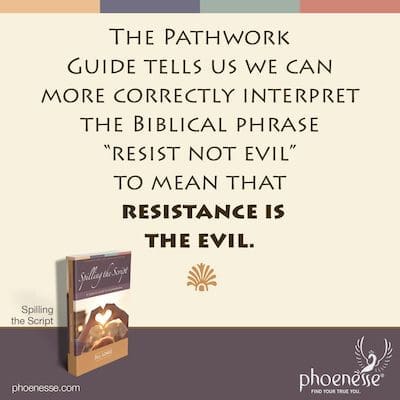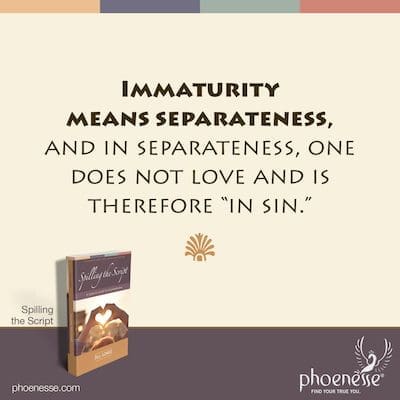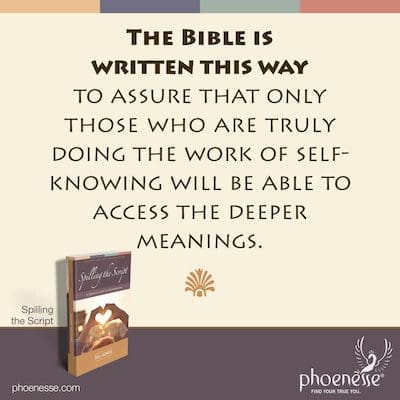The Bible says “In the beginning was the word,” which speaks to the power of words to create—whether they are silent, spoken or written. But there are some words we have developed such a strong negative reaction to, it is like an allergy. “Evil” is one such word.

When we deny our vulnerability, our feelings of shame and being helpless, and our feeling of being unlovable, we create destructive feelings and attitudes. And that is evil. Evil is a defense against suffering. But denial of these original experiences compels us to re-experience them over and over again. And in doing so, we increase the suffering and perpetuate evil.
The Guide tells us we can more correctly interpret the Biblical phrase “resist not evil” to mean that resistance is the evil. Resistance is a tightening up against the flowing movement of love and truth. It is a slowed down consciousness that can only exist as resistance to good. It always obstructs some beautiful, valuable aspect of creation. In the end, resistance really is futile. Because eventually a crisis occurs, which is the breaking point between two opposite desires—evolution and resistance of truth.
“You have begun to understand that to the degree your Lower Self is conscious—thereby enabling you to choose not to act upon it and to pray for help to purify it—you are invulnerable to evil.”
– Pathwork Lecture #248
Learn more in Pearls, Chapter 13: Uncloaking the Three Faces of Evil: Separation, Materialism and Confusion

We resist through laziness and self-indulgence, as well as by distracting ourselves and not being honest about our emotional reactions. Then we project our distortions onto others, blaming them and not seeing how the darkness lives in us. The Guide calls that a “sin”—another loaded word.
“Jesus” is yet another such word. In his series Resurrecting Jesus, spiritual teacher Adyashanti suggests we reframe our sins as being the places where we “miss the mark”. The Guide defines a sin as the lack of love resulting from immaturity of the soul. Immaturity means separateness, and in separateness, one does not love and is therefore “in sin.”
Seven Cardinal Sins
Covetousness | Wanting to have and own what is not yours, which comes from a place of deprivation.
Lust | A selfish desire from child consciousness to receive without having to give, without a true spirit of mutuality.
Anger | A cover to real feelings such as pain, which may also move to collapse.
Gluttony | A distorted way to try to be fulfilled when real inner needs are not fulfilled.
Envy | Wanting to destroy and take what we can’t have because we feel so empty.
Pride | When we did not receive “good-enough” mirroring, we did not get a clear view of a healthy self; this leads to feeling inadequate. Pride is a way to help us feel important.
Sloth | The collapse, when aggression and submission don’t work, that goes to indifference and apathy.
It is important that we not let our reactions to these words keep us from receiving the deeper meaning of these teachings. For this reason, as well as the fact that words can lose their meaning after too much repetition, the Guide often uses alternative words to describe the same thing. For example, divine essence, universal power and greater consciousness are all different expressions for that one hard-to-name word: God.
“Om is another word for God. There are many languages with many different words for the ultimate Creator. It truly does not matter which language you use, provided your mind connects with the source of all that is.”
– The Pathwork Guide in Q&A #244

The Guide explains that the Bible is the most unique document, holding meanings on many levels. This is true despite the mistranslations and human errors that have inevitably crept into it. It is written this way to assure that only those who are truly doing the work of self-knowing will be able to access the deeper meanings.
When people use the most fundamental meaning to support their negativity, they are unknowingly falling for one of the three principles of evil, which is confusion. This includes half-truths that subtly turn into lies without being easily traced. Because they are presented under the guise of divine truth and therefore seem unassailable. Such confusion is an effective weapon of evil.
During the decades of Question-and-Answer sessions, the Guide invited participants to ask questions about Bible verses so they could receive a deeper explanation of their meaning. Read them in Bible Me This: Releasing the Riddles of Holy Scripture, or under the topic The Bible at www.theguidespeaks.com.
“What is the word?…Each word is a blueprint essential for building the structure…It is plan, knowledge, opinion and consciousness. The word is feeling, attitude and intentionality…The word is what is behind all creation…It can be the divine will or the will of the cut-off, ignorant and destructive particle of consciousness. Be it conscious or not, the word is the sum total of your beliefs in any given area where you speak the word. It is the sun that creates the planets. It is energizing force and it is design. So much is contained in the word.”
– Pathwork Lecture #233
Learn more in Pearls, Chapter 8: Articulating the Power of the Word.
Return to Spilling the Script Contents


